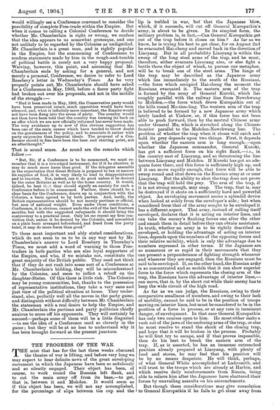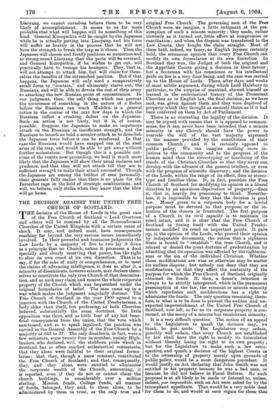91HE mist that has for the last three weeks obscured
1_ the theatre of war is lifting, and before very long we may expect to hear definite news of the great enveloping movement in which the Japanese have been so sedulously and so silently engaged. Their object has been, of course, to work round the Russian left flank, and to cut the main army off from its base,—to get, that is, between it and Mukden. It would seem as if this object has been, we will not say accomplished, for the percentage of slips between the cup and the lip is "trebled in war, htif that the Japanese -131Orii, which, if it succeeds, will cut off General Kuropatkin's army, is about to be given. In its simplest form, the military problem is, in fact,—Can General Kuropatkin get out of the trap before it closes on him ? As far as we know, he is trying his best to get clear, for on August 2nd he evacuated Hai-cheng and moved back in the direction of Liaoyang. But in all probability Liaoyang is within the sweep of the long steel arms of the trap, and he must, therefore, either evacuate Liaoyang also, or else fight a battle there the object of which, to pursue our metaphor, will be to break one of the steel arms. The hinge of the trap may be described as the Japanese army which lies immediately to the south of the Russians, —the force which occupied Hai-cheng the moment the Russians evacuated it. The eastern arm of the trap is formed by the army of General Kuroki, which lies roughly parallel with the railway line from Newchwang to Mukden,—the force which drove Kuropatkin out of the hills round Mo-tien-ling. The western arm of the trap is believed to be formed by a new Japanese army which lately landed at Yinkow, or, if this force has not been able to push forward, then by the neutral Chinese army under General Ma, which is stretched along the Chinese frontier parallel to the Mukden-Newchwang line. The problem of whether the trap when it closes will catch and hold. its prey depends upon two things. First, it depends upon whether the eastern arm is long enough,—upon whether the Japanese commander, General Kuroki, has got a sufficient force on his right flank,—i.e., in the country east of Liaoyang, and so threatening the line between Liaoyang and Mukden. If Kuroki has got an ade- quate force there, and this force is sufficiently high up, and if it can move rapidly enough, that force will be able to sweep round and shut down on the Russian army at or near Liaoyang. But the ability to shut the trap does not prove that the trap will hold. the prey. The arm of the trap, if it is not strong enough, may snap. The trap, that is, may be destroyed if it shuts on a sufficiently hard and powerful object. An enveloping movement seems a splendid device when looked at solely from the enveloper's side ; but when considered from that of the army sought to be enveloped it has a different aspect. That army, instead of calling itself enveloped, declares that it is acting on interior lines, and can take the enemy's flanking forces one after the other and smash them in detail before they can obtain assistance. In truth, whether an army is to be rightly described as enveloped, or holding the advantage of acting on interior lines, depends upon the numbers of the opposing forces and their relative mobility, which is only the advantage due to numbers expressed in other terms. If the Japanese are so numerous or so rapid in their movements that they can present a preponderance of fighting strength whenever and wherever they are engaged, then the Russians must be said to be enveloped. If, on the other hand, the Russian army is so concentrated and so mobile that it can show superior force to the force which represents the closing arm of the trap, the Russians have the advantage of interior lines,— can move, that is, by the short cut while their enemy has to keep the wide circuit of the high road.
As far as we can judge, the Russians, owing to their comparative smallness of numbers, and owing to their lack of mobility, cannot be said to be in the position of troops moving on interior lines, but must be considered to be in the position of a force in process, or at any rate in imminent danger, of envelopment. In that case General Kuropatkin has only two courses open to him. He must either make a rush out of the jaws of the enclosing arms of the trap, or else he must resolve to stand. the shock of the closing trap, and hope that it will be broken in the process. Probably he will first try to escape, and if that proves impossible, then do his best to break the eastern arm of the trap. If, as is asserted, he has an immense entrenched position already prepared at Liaoyang, with plenty of food and stores, he may feel that his position will be by no means desperate. He will think, perhaps, of what General White accomplished at Ladysmith, and will trust to the troops which are already at Harbin, and which receive daily reinforcements from Russia, being able to relieve him after the Japanese have shattered their forces by unavailing assaults on his entrenchments.
But though these considerations may give consolation to General Kuropatkin if he fails to get clear away from Liaoyang, we cannot ourselves believe them to be very likely of accomplishment. It seems to us far more probable that what will happen will be something of this .kind. General Kuropatkin will be caught by the Japanese while he is actually getting into Lia.oyang, and his force will suffer so heavily in the process that be will not have the strength to break the trap as it closes. Then the Japanese will choose and fortify positions so numerous and so strong round Liaoyang that the parts will be reversed, and General Kuropatkin, if he wishes to get out, will 'practically have to besiege his besiegers. They, that is, will not attempt to attack him, but will claim for them- selves the benefits of the entrenched position. But if that happens, the Japanese will only need a comparatively small force to " contain," and ultimately starve out, the Russians, and will be able to devote the rest of their army to attacking the new Russian point of concentration. In our judgment, then, the only thing which can prevent the occurrence of something in the nature of a Sedan before the Russians can reach Mu.kden is a general action in the course of the next few days in which the Russians inflict a crushing defeat on the Japanese. Such an action is not likely, but it is, of course, possible. Suppose the Japanese to make an impetuous attack on the Russians in insufficient strength, and the Russians to launch so bold a counter-attack as to demolish the Japanese force before it can be reinforced. In that case the Russians would have snapped one of the steel arms of the trap, and would be able to get away without further molestation. But though this is a possible out- come of the events now proceeding, we hold it much more likely that the Japanese will show their usual coolness and prudence, and that they will not attack till they are in sufficient strength to make their attack successful. Though the Japanese are among the boldest of men personally, their generals fully realise that there is no place for the Berserker rage in the field of strategic combinations, and will, we believe, only strike when they know that the blow will go home.







































 Previous page
Previous page